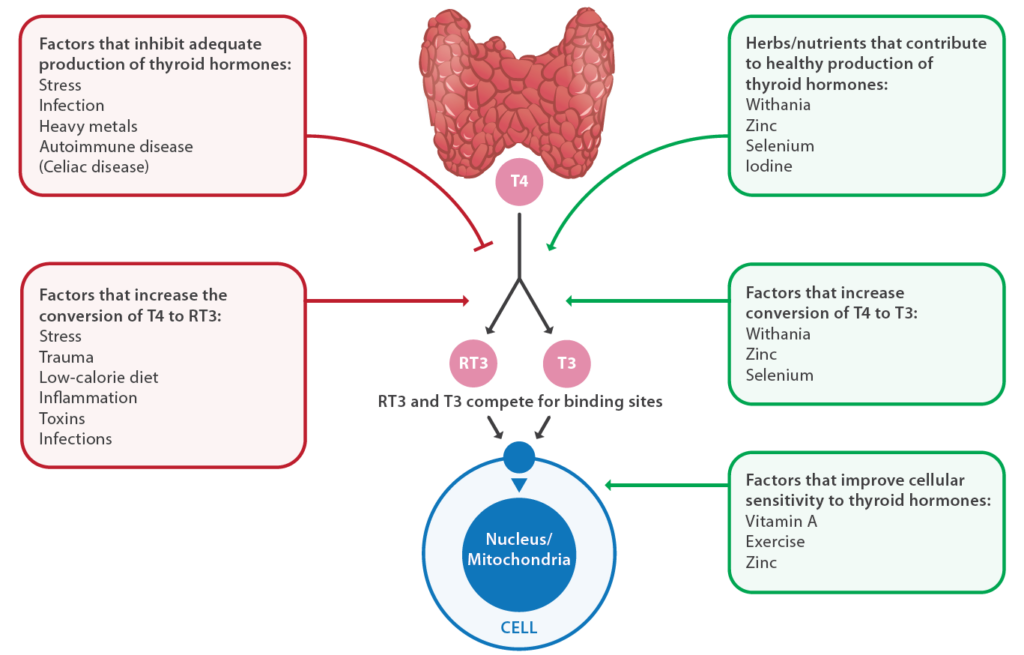From Fatigue to Fog: A Functional Guide to Healing Your Thyroid Naturally
May 13, 2025
As a functional nutritionist, I often see patients struggling with fatigue, brain fog, weight gain, mood imbalances, or cold intolerance—many of which are rooted in thyroid dysfunction. The thyroid is a small, butterfly-shaped gland located at the base of the neck, but don’t let its size fool you—it plays a massive role in your health and vitality. In this blog post, I’ll explore the thyroid’s function, why problems arise, and how a root-cause, systems-based approach can help to restore balance.
What Is the Thyroid, and What Does It Do?
So we know where the thyroid is located, but what does it actually do? The thyroid produces hormones—primarily thyroxine (T4) and triiodothyronine (T3)—that regulate metabolism, energy production, body temperature, heart rate, and even brain development. Did you know that every cell in your body depends on thyroid hormones to function properly? That’s right!
T4 (thyroxine) is the inactive form that must be converted to T3 (triiodothyronine), the active form, in organs like the liver and gut. This is why optimal thyroid health depends not just on the thyroid itself, but also on the health of your digestive and detoxification systems.
In addition, reverse T3 (rT3) is an inactive form of the thyroid hormone triiodothyronine (T3). It is produced when the body converts thyroxine (T4) into rT3 instead of active T3, often as a response to stress, illness, or nutrient deficiencies. While T3 increases metabolism and energy, rT3 acts as a metabolic “brake,” slowing down these processes. Elevated rT3 levels can interfere with thyroid function by blocking T3 from binding to receptors, potentially leading to symptoms of hypothyroidism even if TSH and T4 levels appear normal.

Common Symptoms of Thyroid Imbalances
I see so many patients who complain of symptoms they are experiencing, but don’t realize that they can all be linked back to their thyroid. Symptoms such as:
- Fatigue or sluggishness
- Brain fog or poor concentration
- Unexplained weight gain or difficulty losing weight
- Cold hands and feet
- Hair thinning or hair loss
- Depression or anxiety
- Constipation
- Menstrual irregularities
While these symptoms can be brushed off as “normal” or stress-related, they often point to a deeper imbalance in the thyroid system.
What Causes Thyroid Dysfunction?
In conventional medicine, hypothyroidism is often labeled as an autoimmune condition (Hashimoto’s) or an iodine deficiency and treated with synthetic hormones. While this helps symptoms, it rarely addresses why the thyroid is under-functioning in the first place.
In functional medicine, we look upstream to identify the root causes of thyroid dysfunction, which often include:
- Environmental Toxins and Heavy Metals: Mercury, fluoride, and bromine can interfere with iodine uptake, which is essential for thyroid hormone production. These disruptors are often found in dental amalgams, drinking water, non-stick cookware, and industrial pollutants.
- Mold and Mycotoxins: Mold exposure from water-damaged buildings can be a stealth culprit. Mycotoxins impair mitochondrial function, provoke chronic inflammation, and trigger autoimmune responses—all of which compromise thyroid health.
- Estrogen Dominance: When the liver is overwhelmed by toxins or the gut microbiome is out of balance, estrogen isn’t properly cleared from the body. Excess estrogen blocks thyroid hormone at the receptor level and increases thyroid-binding globulin (TBG), leaving less free (active) hormone available.
- Leaky Gut and Food Sensitivities: The gut is the command center of your immune system—and 20% of T4 is converted to T3 here. When the intestinal lining becomes permeable (a condition known as leaky gut), food proteins like gluten and casein can provoke an immune response that may cross-react with thyroid tissue (a process called molecular mimicry). This is a common trigger in autoimmune thyroid disease.
The Gut-Brain-Thyroid Connection
The gut, brain, and thyroid are intricately linked. Chronic stress—whether emotional, psychological, or physical—activates the hypothalamic-pituitary-adrenal (HPA) axis and increases cortisol output. Elevated cortisol does three things detrimental to thyroid health:
- Suppresses TSH (the hormone that stimulates the thyroid)
- Reduces conversion of T4 to T3
- Increases reverse T3, a “brake” hormone that blocks T3 at the cellular level
Cortisol also compromises gut integrity, decreases digestive enzyme production, and reduces absorption of critical thyroid nutrients like selenium, zinc, magnesium, iron, and B vitamins. These deficiencies create a vicious cycle: poor thyroid function → more stress → further nutrient depletion.
Some of the most common stressors that can have an impact on the gut/brain axis and the thyroid include:
- Surgery or injury
- Inflammation
- Nutritional deficits
- Mold & mycotoxins
- Metals, chemicals
- Pituitary stress
Healing the Thyroid Holistically
In functional medicine, thyroid care involves more than adjusting hormones—it’s about restoring harmony across the body’s systems. Here are some key pillars of thyroid healing:
- Remove toxins (support liver detox, avoid plastics, filter water and air)
- Heal the gut (repair leaky gut, address dysbiosis, reduce inflammatory foods)
- Balance hormones (address estrogen dominance, optimize adrenal function)
- Support nutrient levels (use food as medicine and supplement where needed)
- Manage stress (mindfulness, breathwork, somatic therapies, and nervous system regulation)
Your thyroid doesn’t break down in isolation—it’s responding to what’s happening elsewhere in your body. Whether it’s chronic stress, hidden infections, gut imbalances, or toxic overload, your symptoms are signals, not annoyances. In functional medicine, our job is to listen, investigate, and support the body’s innate capacity to heal.
If you suspect a thyroid issue or are already on medication but still don’t feel like yourself, it may be time to dig deeper. And this is something that you don’t need to do on your own or feel overwhelmed about. I am here to help you the entire way through the end! Use the link below to schedule a free 15-minute discovery call so we can chat about what’s going on and make a game plan on how to help you.